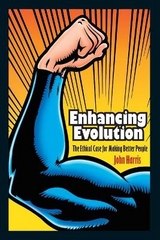
Enhancing Evolution
Princeton University Press (Verlag)
978-0-691-12844-3 (ISBN)
- Titel erscheint in neuer Auflage
- Artikel merken
Decisive biotechnological interventions in the lottery of human life - to enhance our bodies and brains and perhaps irreversibly change our genetic makeup - have been widely rejected as unethical and undesirable, and have often met with extreme hostility. But in "Enhancing Evolution", leading bioethicist John Harris dismantles objections to genetic engineering, stem-cell research, designer babies, and cloning to make a forthright, sweeping, and rigorous ethical case for using biotechnology to improve human life. Human enhancement, Harris argues, is a good thing - good morally, good for individuals, good as social policy, and good for a genetic heritage that needs serious improvement."Enhancing Evolution" defends biotechnological interventions that could allow us to live longer, healthier, and even happier lives by, for example, providing us with immunity from cancer and HIV/AIDS. But the book advocates far more than therapies designed to free us from sickness and disability. Harris champions the possibility of influencing the very course of evolution to give us increased mental and physical powers - from reasoning, concentration, and memory to strength, stamina, and reaction speed.
Indeed, he supports enhancing ourselves in almost any way we desire. And it's not only morally defensible to enhance ourselves, Harris says. In some cases, it's morally obligatory. Whether one looks upon biotechnology with hope, fear, or a little of both, "Enhancing Evolution" makes a case for it that no one can ignore.
John Harris is the Sir David Alliance Professor of Bioethics at the University of Manchester School of Law, joint editor-in-chief of the "Journal of Medical Ethics", and a member of Britain's Human Genetics Commission. His many books include "On Cloning" and "A Companion to Genethics". "Enhancing Evolution" is based on keynote lectures Harris delivered at the James Martin Institute at the University of Oxford in 2006.
Foreword by Steve Rayner ix Acknowledgments xv Introduction 1 Chapter 1: Has Humankind a Future? 8 Chapter 2: Enhancement Is a Moral Duty 19 Chapter 3: What Enhancements Are and Why They Matter 36 Chapter 4: Immortality 59 Chapter 5: Reproductive Choice and the Democratic Presumption 72 Chapter 6: Disability and Super-Ability 86 Chapter 7: Perfection and the Blue Guitar 109 Chapter 8: Good and Bad Uses of Technology 123 Chapter 9: Designer Children 143 Chapter 10: The Irredeemable Paradox of the Embryo 160 Chapter 11: The Obligation to Pursue and Participate in Research 184 Notes 207 Bibliography 227 Index 239
| Erscheint lt. Verlag | 2.9.2007 |
|---|---|
| Verlagsort | New Jersey |
| Sprache | englisch |
| Maße | 152 x 235 mm |
| Gewicht | 510 g |
| Themenwelt | Geisteswissenschaften ► Philosophie ► Ethik |
| Naturwissenschaften ► Biologie | |
| Technik ► Umwelttechnik / Biotechnologie | |
| ISBN-10 | 0-691-12844-8 / 0691128448 |
| ISBN-13 | 978-0-691-12844-3 / 9780691128443 |
| Zustand | Neuware |
| Informationen gemäß Produktsicherheitsverordnung (GPSR) | |
| Haben Sie eine Frage zum Produkt? |
aus dem Bereich



